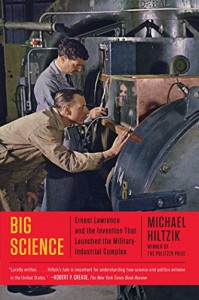Currently reading
Eleven
A Month in the Country
A Tale of the Dispossessed: A Novel
Mesabi Pioneers
The Crusades Through Arab Eyes
Island of a Thousand Mirrors
Big Science: Ernest Lawrence and the Invention that Launched the Military-Industrial Complex
 Ernest Lawrence, the nuclear bomb program, and accelerator science are all linked inextricably in history. Lawrence was a talented experimentalist, a gifted lab manager and talent scout, and a spell-weaving salesman. Before him, most science was tabletop experiments with budgets pulled together from universities and private donors. Afterward, large collaborations funded by government funds were the norm in physics.
Ernest Lawrence, the nuclear bomb program, and accelerator science are all linked inextricably in history. Lawrence was a talented experimentalist, a gifted lab manager and talent scout, and a spell-weaving salesman. Before him, most science was tabletop experiments with budgets pulled together from universities and private donors. Afterward, large collaborations funded by government funds were the norm in physics. Hiltzik does a wonderful job of capturing Lawrence's personality and priorities in this biography. He traces how he made fast friends and attracted acolytes, while eventually alienating many talented scientists because of his need to be in control. He also tracks Lawrence's disdain for all things political and how that very disdain led to the Rad Lab in Berkeley being a bastion for conservative politics -- if no protests or left-wing associations are allowed, right-wing associations dominate. Nuclear science and national security were knitted together by Lawrence's hand, and he seemed surprised that politics would invariably come along for the ride.
Lawrence was both loved and hated. He invented the cyclotron and accelerator science. He also was an unabashed champion of not only the Manhattan project but the super H-bomb that was developed afterwards. He encouraged and mentored young physicists and not only stopped speaking to old friends but ordered his Rad Lab staff to stop speaking to them at seemingly slight provocation. He could get people excited about his next project, could convince them to empty their wallets, even when his predictions were, ummm.... uber optimistic at best.
The biography holds together well. There is a lot of politics in it, especially through the test ban and super bomb debates, but that was a dominant theme of Lawrence's later life. The author has some elitist dismissals of all schools non-ivy that alienated me early in the book, but those mostly went away after the first 60 pages or so. I found his tone informative but not too judgemental throughout most of the book. The author is clearly a fan of Lawrence's, but it's a good read.
I got a free copy of this through Net Galley.









